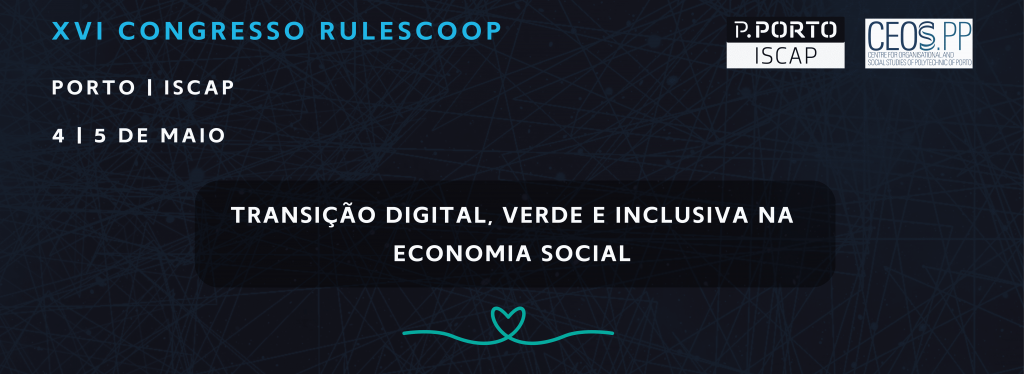Digital, green and inclusive transition in the Social Economy
In times of uncertainty and successive crises, solutions are emerging that question current economic, environmental, and social relations. In this context, marked by the digital, green, and inclusive transition, the XVI RulesCOOP Congress invites the academic, scientific, and professional community to debate the role of the social economy in this transition.
Digital Transformation is a widely used term being critical for organisations, as technologies, information systems, and processes go hand in hand with this transformation. It is about performing organisational tasks by integrating technologies and information systems to dematerialise processes, creating internal and external information flows, and enhancing interoperability. In this context, it is essential to know: (i) the state of the art of social economy organisations regarding installed capacity and preparation to face this challenge; (ii) how the digital transition can improve the performance of these organisations, making them more inclusive and sustainable.
The green transition has been prominent on the international agenda in recent decades and has been the target of various legislative instruments. Ensuring the transition to clean energies, promoting self-consumption and fighting energy poverty has been the most relevant concerns of this international agenda for a greener and more inclusive planet. In this congress, we intend to reflect on: (i) the role of the social economy in defence of the most vulnerable groups in energy terms, (ii) the creation of public policy instruments for the protection of vulnerable citizens and for the promotion and active involvement of citizens in the green transition; (iii) the role of social economy entities in energy democratisation and decentralisation.
In the imperative of building a more inclusive society that leaves no one behind, social economy entities play an important role. In this congress, we intend to reflect on: (i) the position of social economy organisations in the face of complex challenges such as discrimination (gender, race, etc.), strong migratory flows, integration of disabled people, access to decent work, among many others; and (ii) the role of public policies in promoting this inclusive dimension of social economy organisations.
Thus, the 16th RulesCOOP Congress aims to bring together specialists, young people and professionals from the social economy sector to debate challenges and strategies for a more active social economy, prepared to face the challenges posed by the digital, green and inclusive transition. More general papers are also accepted, focusing on other trends and challenges in the social economy, such as volunteering, financing and accountability, and social innovation.
The Congress is aimed at three target groups:
- researchers dedicated to studying the trends and challenges of the social economy;
- undergraduate, master’s, doctoral or postgraduate students working in the social economy
- professionals in the social economy sector who aim to share their management and intervention practices.
Papers may be written/submitted in Portuguese, Spanish or English and are subject to prior evaluation by the Congress Scientific Committee. The papers will be subsequently published in the Congress Proceedings and integrated into the CEOS.PP Publications. It is accepted for publishing papers in short format (up to 6 pages) or developed (up to 12 pages) in accordance with the APA standards and the model provided on the Congress website. Later the opportunities for publication in journals associated with the Congress will be announced.
Papers will only be considered for publication if at least one of the authors registers in Congress as an author. Each author may present a maximum of two papers.
Submissions are made through the easychair platform at the link: https://easychair.org/conferences/?conf=xvirulescoop2023.
Articles should answer the following questions:
- What problem is studied/analysed, and why is it relevant or important?
- What is the state of the art on the topic?
- What methodological approach has been used or is proposed to be used?
- What are the results (if applicable)?
Important dates:
April 14th: Submission deadline
April 20th: Notification of acceptance by the Congress scientific committee
May 4th and 5th: Congress in hybrid mode
Contacts: rulescoop.iscap@iscap.ipp.pt
Registration fees
| Until 15 April (Early bird) | After 15 April | |
| Authors | 150 € | 150 € |
| CEOS.PP Researchers | 100 € | 150 € |
| RulesCOOP representatives | Free | Free |
| ISCAP students with paper | Free | Free |
| Other students with paper | 50 € | 50 € |
| ISCAP students without paper | 30 € | 50 € |
| Other students without paper | 75 € | 100 € |
| Other participants without paper | 100 € | 150 € |
Registrations must be made from the congress website. Registrations by email will not be accepted. After payment, please send proof of payment to rulescoop.iscap@iscap.ipp.pt .

